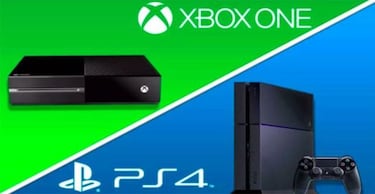Seven years later, Microsoft admits Xbox One's flop vs. PS4
The company shares for the first time in seven years console sales data and reveals that Xbox One sold less than half as much as PlayStation 4.

In early 2016, more than 7 years ago, Microsoft stopped providing Xbox One sales data and focused on the numbers of Xbox Live and its online services (Game Pass). A decision that meant that we were never entirely clear about the console's numbers, even though we sensed that it was lagging behind PlayStation 4 and Nintendo Switch. However, Brazil's Administrative Council for Economic Defense (CADE) has "leaked" a document with the company's signature in which, for the first time, the situation experienced by the platform is recognized:
"Sony has surpassed Microsoft in terms of console sales and installed [sic] base, having sold more than twice as many Xbox [One units] in the last generation." So reads a statement that comes just days after Sony confirmed that it will no longer update PS4 data, leaving the platform at 117.2 million, enough to make it the fourth best-selling platform in history. Taking those figures into account, Xbox One didn't even reach 58.5 million consoles sold (to Xbox 360's 85.8). Some market analysts such as Ampere have always predicted that it should be around 51 million, a prediction now supported by the CADE document. An open secret that is coming to an end.

A new war between Microsoft and Sony?
Xbox One numbers are not the only thing leaked by the Brazilian institution these weeks. It also recently revealed that Sony had branded Microsoft's purchase of Activision Blizzard as an "anti-competitive practice". The Redmond company did not shut up, far from it, and accused its rival of "pay for ‘blocking rights’ to prevent developers from adding content to Game Pass."
Related stories
"Considering that exclusivity strategies have been at the core of Sony’s strategy to strengthen its presence in the games industry, and that Sony is a leader in the distribution of digital games, Sony’s concern with possible exclusivity of Activision‘s content is incoherent, to say the least," Microsoft explained in another CADE document. "It only reveals, once again, a fear about an innovative business model that offers high-quality content at low costs to gamers, threatening a leadership that has been forged from a device-centric and exclusivity-focused strategy over the years. Indeed, Microsoft’s ability to continue expanding Game Pass has been obstructed by Sony’s desire to inhibit such growth. Sony pays for ‘blocking rights’ to prevent developers from adding content to Game Pass and other competing subscription services. [Sony] does not want attractive subscription services to threaten its dominance in the digital distribution market for console games."
After so many studio purchases and with the emergence of so many subscription services, the video game industry seems to be experiencing a tense calm in which hints are flying around. We will see how the relationship between the two companies evolves and if, for example, it affects the appearance of Call of Duty on PlayStation consoles.
